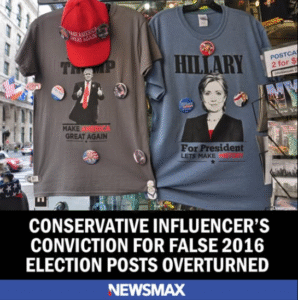A U.S. appeals court has overturned the conviction of conservative social media influencer Douglass Mackey, known online as “Ricky Vaughn,” who had previously been found guilty of conspiring to interfere with voters’ rights during the 2016 presidential election. The ruling, handed down by the 2nd U.S. Circuit Court of Appeals, marks a major legal shift in how courts may interpret political speech online, especially when it comes to the spreading of misinformation.
Mackey was convicted in 2023 on charges of conspiring to deprive individuals of their right to vote. The case centered around a series of memes and online posts he published in the run-up to the 2016 election, many of which falsely instructed Hillary Clinton supporters to vote by text message or social media—a method that is not legally valid in any U.S. election. Prosecutors argued that the memes were designed to mislead and discourage people from voting, particularly targeting Black and minority voters. At the time of the posts, Mackey had a significant online following and influence on political Twitter (now known as X).
The original conviction had sparked a wide debate over the line between free speech and voter suppression. Prosecutors had argued that Mackey’s actions amounted to a coordinated effort to disenfranchise voters and therefore violated federal law protecting voting rights. However, Mackey and his defense team argued that his posts were satirical in nature, not part of any criminal conspiracy, and should be protected under the First Amendment.
In its unanimous decision to overturn the conviction, the three-judge panel of the 2nd Circuit found that the government had failed to prove a key element of the crime: that Mackey had entered into an agreement with others to commit an illegal act. Conspiracy requires more than just shared intent or common goals; it requires a demonstrable agreement between two or more parties. The court ruled that while Mackey’s conduct may have been offensive or misleading, the evidence did not support a criminal conspiracy charge.
The judges emphasized that the First Amendment protects even controversial or untruthful political speech unless it is clearly linked to criminal conduct. They noted that there was no concrete proof that Mackey’s memes prevented any specific individual from voting or that he had worked in coordination with others to do so. The decision underscores the importance of maintaining a high standard of proof in criminal cases, particularly those involving political expression.
The ruling has drawn strong reactions from across the political spectrum. Supporters of Mackey hailed the decision as a victory for free speech and a rejection of what they called politically motivated prosecution. Critics, however, argued that the ruling sets a troubling precedent and could embolden others to use online platforms to spread misinformation designed to interfere with elections.
Mackey celebrated the reversal on social media, calling the ruling a vindication and thanking his legal team and supporters. He also suggested that he may consider legal action against those involved in his prosecution, although no formal steps have been taken.
The Department of Justice has not yet commented on whether it will seek a rehearing or appeal the ruling to the Supreme Court. Legal experts say that while the decision weakens the government’s case in similar future prosecutions, it does not prevent the enforcement of election laws—provided that prosecutors can demonstrate the required elements of conspiracy or direct harm.
The case has broader implications for how courts handle misinformation in the digital age, especially during election cycles. While the government can still prosecute deliberate efforts to interfere with voting, the Mackey ruling makes clear that such prosecutions must be built on solid evidence of collaboration and intent, not just individual speech—no matter how misleading or damaging it may be.
This decision arrives amid growing concern about the role of social media in shaping public opinion and influencing democratic processes. With new technologies and platforms evolving rapidly, lawmakers and legal scholars continue to debate the proper balance between safeguarding elections and protecting free expression. The Mackey case is now likely to become a reference point in that ongoing debate.
As the 2024 election cycle progresses, this ruling may influence how the Justice Department and other authorities approach online disinformation. The line between protected speech and criminal interference remains a challenging one to navigate, especially in an era where memes, misinformation, and viral content can reach millions instantly.
In conclusion, while the appeals court acknowledged the troubling nature of Mackey’s posts, it found that they did not meet the legal threshold for criminal conspiracy. The court’s decision sends a clear message: misleading speech alone, absent clear proof of coordination or intent to commit a crime, is not enough to justify a federal conviction under existing law.


